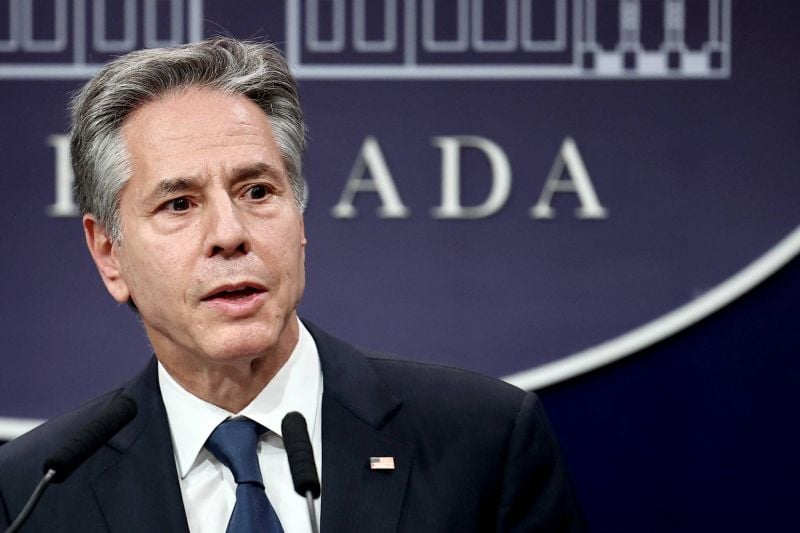
U.S. Secretary of State Antony Blinken attends a joint press conference with Argentina's Foreign Minister Diana Mondino, at the Casa Rosada Presidential Palace, in Buenos Aires, Argentina February 23, 2024. REUTERS/Agustin Marcarian
BEIRUT — US Secretary of State Antony Blinken seems to have instigated a U-turn in US policy toward Israeli settlements in the occupied West Bank on Friday, describing them as "inconsistent with international law."
Since 2019, the US had, under the so-called “Pompeo Doctrine” not recognized settler houses on the occupied West Bank as illegal under international law. But Friday's comments suggest a significant shift, undoing what former US President Donald Trump's administration had established.
What was the 'Pompeo Doctrine'?
On Nov. 18, 2019, then-Secretary of State Mike Pompeo, serving in Trump's administraion, declared that Israeli settlements were not “inconsistent with international law." Pompeo said this change was to correct Obama-era policy which stated that the establishment of civilian settlements violated international law. Pompeo and Trump claimed that "hadn’t worked" and that it hadn't "advanced the cause of peace."
What has the US said now?
Effectively, Antony Blinken has indicated a reversal of the "Pompeo Doctrine," stating that the United States was "disappointed" in Israel's announcement made 24 hours earlier of plans to build new housing in the occupied West Bank, saying the plans were counterproductive to reaching an enduring peace, cited in a Reuters report.
On Thursday, Israel's far-right Finance Minister Bezalel Smotrich said Prime Minister Benjamin Netanyahu and other ministers had agreed to convene a planning council to approve some 3,300 homes to be built in settlements, following a deadly Palestinian shooting attack in the West Bank on Thursday, Reuters reported. The Palestinian Foreign Ministry condemned the Israeli settlement announcement, saying on social media that it undermined the chances of a two-state solution.
Blinken said he was reaffirming the US position that settlements are "inconsistent with international law" and that it "maintains a firm opposition to settlement expansion" because it "only weakens, doesn't strengthen, Israel's security."
Most countries regard the settlements as a violation of international law, viewing the transfer of any country's civilians to occupied land as illegal under the Fourth Geneva Convention of 1949 and UN Security Council resolutions. Israel claims a biblical birthright to the land.
Why does it matter?
When the 'Pompeo Doctrine' was introduced by Trump and Pompeo in 2019, it overturned decades worth of US policy which had endured since 1978 when then-President Jimmy Carter declared that Israeli settlements were a violation of international law.
Since Joe Biden took the presidency in 2021, his administration has generally continued Trump's Middle East policy of keeping the US embassy in Jerusalem and encouraging normalization deals between Israel and Arab states.
However, some things have started to shift, notably with concerns raised publicly by the US to Israel about its ground campaign in Rafah, in southern Gaza, as well as new sanctions on Israeli settlers who participate in violent attacks against Palestinians.
The Biden administration has repeatedly said the expansion of settlements were counterproductive to lasting peace but Blinken's comments on Friday mark the first time that a US official of the Biden-era has outright said they were inconsistent with international law.
Blinken also reaffirmed that the United States opposes any "reoccupation" of Gaza once the war is over, in reaction to Netanyahu's announcement of a "post-war" plan that calls for Israel to maintain "security control" in the occupied West Bank and Gaza.
"I haven't seen the plan, so I'll reserve judgment," said Blinken, speaking at a press conference in Buenos Aires during a whirlwind visit to Argentina, as reported by AFP. But "there must be no Israeli reoccupation of Gaza" and the "territory of Gaza must not be reduced," he stressed.
The Israeli army has assigned specific brigades with the task of demolishing buildings in Gaza within one kilometer of the militarized border with Israel, in order to create a "buffer zone." Large swaths of agricultural land have also been destroyed in the process of creating the buffer zone, which would cut deep into an already densely populated and blockaded enclave.
